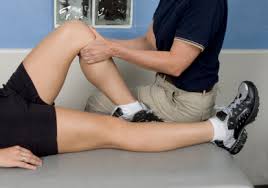I've been out of skating action for a week and a half owing my knee injury. I must say, not being able to skate is definitely causing me more discomfort than the physical knee pain. How am I to deal with the physical and psychological pains?
In general, there are three methods of dealing with
physical pain:
1) Eliminate the
source of the pain;
2) Reduce the
pain itself;
3) Change one's
interpretation of the pain.
Let me briefly consider how these strategies apply to my knee injury:

1) To eliminate the source of pain - clearly the ideal - I must rest my knee allowing it to heal. If my body can't heal the knee on its own, I'd intervene with exercises as directed by a professional. If that too proved inadequate, corrective surgery may be in order.

2) The reduction of pain when its source can't be (or while it's being) remedied is commonly through painkillers of different strengths and varieties. Of course, other methods exist. One such method applies the
Gate Control Theory of pain, according to which pain and touch receptors/sensory nerves are independent of each other and even compete for the brains attention. Interestingly, touch signals travel to the brain faster than pain signals. Hence, if a person's skin is stimulated while they feel pain, the touch signals enter the brain and somewhat block the pain signals. Some chronic pain is treated through the insertion of devices that stimulate touch receptors or nerves in the spine. This theory explains why people tend to rub their hand or knee on having struck it: the stimulation of the touch receptors helps block pain signals.

3) If pain persists, I can interpret it in more positive ways. It's one sort of pain when one interprets it as an unnecessary nuisance or as a sign of one's own stupidity and clumsiness. It's another, more tolerable sort, when it's seen as a
lesson in future safety measures, as a
challenge to draw on ones hidden psychological powers, or simply as a 'battle scar'. Though often viewed as a last resort, in actuality, this strategy should accompany the preceding strategies, as it can aid the entire process of pain treatment.
I can employ these same approaches to help me deal with my psychological pain of being unable to skateboard:
1) I could try to heal my knee so that I can resume skating. Any progress toward that goal should provide me with increased optimism and hope and thus reduce pain levels.
2) I could engage in other activities to divert my attention from skateboarding altogether, and thereby 'block' the pain signals.

3) I could submit my will to God's will by remembering the formula: a) Everything is from God; b) God is good; c) therefore, what I'm going through now is good as well even though
I can't see how. In this way I can be at peace with my situation, and with reality.
Similar to how the third approach should permeate the preceding two approaches when treating physical pain, the above formula should accompany the treatment of psychological pain. Moreover, it should be in place even if no pain is felt, for such a belief can help
prevent much psychological pain from ever arising...

No comments:
Post a Comment